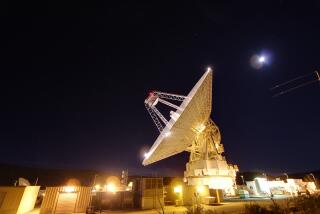A Black Hole for JPL Property : Report: Audit finds widespread violations of NASA regulations on equipment loans to employees, with huge losses. Caltech agrees record-keeping must be improved at space lab.
- Share via
The Jet Propulsion Laboratory is allowing employees to take home thousands of government-owned personal computers, cellular telephones, fax machines, VCRs, television sets and other electronic equipment and keep them for years, in violation of NASA regulations, the U.S. General Accounting Office reported Tuesday.
The GAO said that JPL also is losing about $1 million in property every year--the worst record of any of the NASA centers the government accountants investigated. In 1992 alone, the laboratory lost $3.4 million worth of equipment.
“Over the past five years, the Jet Propulsion Lab has spent millions of taxpayer dollars on questionable purchase of home computers for employees, failed to track millions of dollars of property bought in the government’s name and written off millions more in lost or stolen government equipment,” said Carl Levin (D-Mich.), chairman of the Senate government management subcommittee that commissioned the report.
“This is no way to run one of our nation’s premier research centers,” Levin said.
The GAO report is the second in a series of critical reports on JPL’s management practices. It comes at a time when NASA’s inability to balance its books or keep track of billions of dollars worth of equipment is under increasing scrutiny by Congress and the agency’s inspector general.
NASA officials recently testified that the agency could not locate the documents that account for more than one-third of NASA’s assets--about $12 billion worth of property--and could not reconcile about one-third of its annual spending in its books, covering about $4.5 billion in expenditures.
Unlike other NASA research centers, the $1-billion-a-year Jet Propulsion Laboratory is managed by a university, Caltech, which has run the sprawling facility for NASA since the agency was chartered in 1958. Caltech recently won a new five-year contract to continue operating the center.
Officials at Caltech and JPL agreed Tuesday with most of the report’s criticism and said they were already trying to correct the problems.
“We agree that substantial improvements are needed,” JPL spokesman Franklin O’Donnell said. “We are working actively on identifying the specific changes and we are committed to implementing them.”
Most NASA centers let employees borrow equipment to work at home, but the practice is unusually widespread at JPL, the GAO said.
NASA and JPL regulations allow government equipment to be loaned temporarily to employees to conduct NASA missions or perform official duties. JPL officials said Tuesday that the agency gets “thousands of hours in unpaid overtime each week” from employees working at home on loaned equipment.
Regulations forbid the actual purchase of equipment solely to lend to employees and limit how long such equipment can be kept on loan at home, usually about 30 days.
But at JPL, more than 4,000 computer-related items worth about $7.6 million are on loan to employees, many of whom have kept them for more than two years. More than $1 million worth of the equipment was new and had been loaned to employees within a month of purchase, the investigators found.
The practice is “widespread and increasing,” the GAO reported.
In the past two years, the amount of equipment taken home on loan by employees increased 40%, according to GAO. The report said that there were “major weaknesses” in JPL’s efforts to keep track of government-owned equipment and that its controls were inadequate.
JPL, for example, has no idea how much equipment Caltech has bought with JPL purchase orders as part of its work for the space agency. The university may have up to $4 million worth of NASA computers and other electronic equipment unbeknown to agency managers, the GAO report said.
The problem is that there is no way for NASA to know that it should reclaim the equipment when the contract work is done. “A Caltech property tag is placed on the equipment, but no NASA property tag is attached unless Caltech notifies JPL of its delivery to Caltech,” the investigators said. “Usually, no one was notified.”
Caltech spokesman Max Benavidez said the problem was an accounting matter. “Caltech feels that we do need to make improvements in the way JPL manages its property and we are in the process of doing that.”
More to Read
Inside the business of entertainment
The Wide Shot brings you news, analysis and insights on everything from streaming wars to production — and what it all means for the future.
You may occasionally receive promotional content from the Los Angeles Times.










